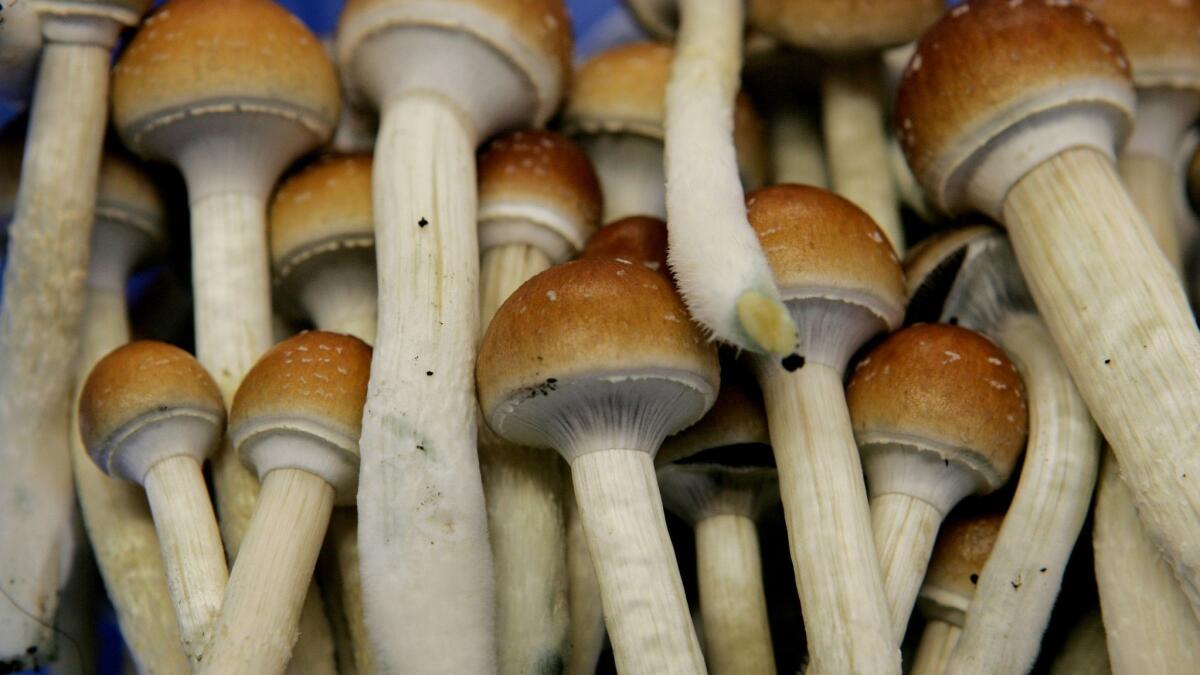Denver votes to decriminalize magic mushrooms, in unofficial results

- Share via
Reporting from Denver — In a last-minute surprise, it appears this city has lived up to its libertarian leanings and passed an ordinance decriminalizing hallucinogenic magic mushrooms, the first measure of its kind in the nation.
For much of the last two days, Initiative 301 appeared headed for defeat, but late Wednesday the city of Denver released what it called the “final unofficial results” showing the measure passing by a razor-thin vote margin of 50.56% to 49.44%. The results will be certified May 16.
“The last 24 hours have been a hell of a ride,” said Kevin Matthews, who heads Decriminalize Denver, which spearheaded the ordinance. “Most of the votes are in, though there are still some outstanding absentee ballots. This is the unofficial, official victory.”
And he said it sends a clear message to the rest of the country.
“That message is that the American people are ready for a broader conversation around psilocybin and that no person should ever be treated like a criminal for using a mushroom,” he said.
The ordinance would essentially prohibit local authorities from enforcing criminal penalties for possession of psilocybin mushrooms for personal use.
California failed to get a similar measure on the ballot last year. Activists in Oregon hope to put the issue to a statewide vote in 2020. There are moves in Iowa and other states to do the same.
Denver has been a pioneer in drug legalization. It decriminalized marijuana in 2005, seven years before Colorado became the first state to legalize i, and last November the city tried to create the nation’s first “safe injection” site — a medically supervised area for intravenous drug users. That failed after being declared illegal by state and federal authorities.
The apparent victory for magic mushrooms will probably have implications for cities and towns across the nation, potentially opening a new frontier in state and local efforts to circumvent the federal government’s longtime crackdown on mind-altering substances.
“This is actually quite remarkable,” said Dr. Charles Grob, a UCLA psychiatrist who has researched hallucinogens for more than 30 years. “It’s the first time in the history of this country that a Schedule I psychedelic has been decriminalized.”
Still, Grob said it must be handled responsibly or it could all go off the rails.
“In Denver, the public health authorities will need to roll out a strong public health campaign. They will need to explain to people the effects of the drugs and how they can be safely utilized,” he said. “People need to be told that mushrooms should not be mixed with alcohol or other substances. Driving a vehicle would be ill-advised.”
Law enforcement, he said, must also be trained to handle people having a bad trip.
“They would need to be handled gently because they are in a profoundly altered state,” Grob said. “If people in Denver show they can use good judgment with no untoward outcomes, perhaps this will set the stage for other cities and states to pass similar legislation.”
The ordinance calls for the mayor to set up an oversight committee of local officials, law enforcement, representatives from the district attorney’s office and public health officials to oversee how the initiative is carried out.
Denver Mayor Michael Hancock, whose reelection bid was also on Tuesday’s ballot, opposed the initiative. He failed to get the majority needed to win another term outright, so he faces a runoff with Jamie Giellis, who also opposed it.
“We want to make sure that whoever ends up being mayor has all the information they need. We also want the panel created as soon as possible,” Matthews said. “Their opposition may be based on a lack of understanding. What we will do is what we have always done — educate people.”
Much as they did for marijuana, advocates have spent months touting the potential medical benefits of psilocybin mushrooms to win public acceptance for a drug known more for its recreational use.
Matthews credits psilocybin mushrooms with helping him overcome a crippling depression. Others say they have helped them overcome anxiety, drug addiction and post-traumatic stress disorder.
In October, the Food and Drug Administration gave a go-ahead to a London-based company, Compass Pathways, to test psilocybin in people with treatment-resistant depression. The company received a “breakthrough therapy” designation, which is meant to speed development of drugs when preliminary evidence suggests they may be significantly better than current therapy in treating serious conditions.
Critics of the Denver campaign say that for all of the focus on the drug’s medical potential, the initiative would allow psilocybin for personal use of all types.
“Denver is quickly becoming the illicit drug capital of the world,” Jeff Hunt, director of the Centennial Institute at Colorado Christian University, a conservative think tank, said before the vote.
But decriminalization means users can at least rest easier than before.
Justin, who asked that his last name not be used, suffers from bipolar disorder. He takes psilocybin in “microdoses” three times a week and says the effect has been “transformative.” Instead of being on six medications, he takes a mood stabilizer and uses magic mushrooms.
The risk of being arrested has always worried him.
“I have a low-grade anxiety just having it around,” he said. “If you were caught there were very real consequences.”
He is pleased with what looks like a victory for mushrooms.
“This is a step in the right direction. Decriminalization is a start,” he said. “Next is to get it approved by the Food and Drug Administration.”
Kelly is a special correspondent.
More to Read
Sign up for Essential California
The most important California stories and recommendations in your inbox every morning.
You may occasionally receive promotional content from the Los Angeles Times.













